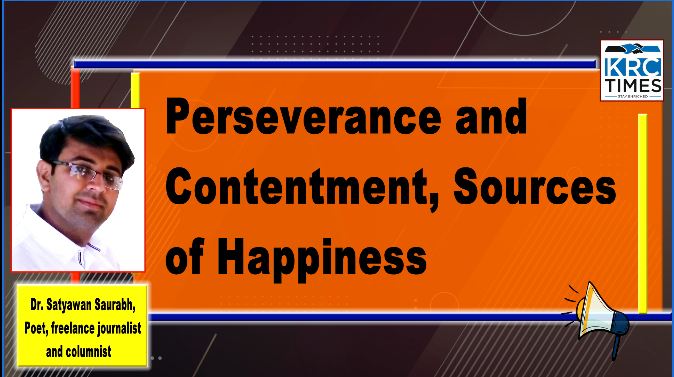We might want a nicer car, a bigger house, a better-paying job, or more money, As soon as we achieve one thing, the race for the next thing begins
 Satywan Saurabh
Satywan Saurabh

As humans, we tend to focus on what we do not have, and ignore or even ignore what we do have. Many people today think that life is a race where you have to be the best at everything. We might want a nicer car, a bigger house, a better-paying job, or more money.
As soon as we achieve one thing, the race for the next thing begins. Many people do not take out even a minute to be grateful for everything they have achieved. Instead of looking back at the distance they have covered, they push themselves to cover the distance that remains. And in some cases, this is when ambition becomes greed.
Perseverance is the steadfastness of spirit, especially in hardship. It provides continuity in the pursuit of virtue. Perseverance is the willingness to independently go beyond the call of duty, to make sacrifices, and to act on one’s beliefs. Fortitude involves having the courage to face our weaknesses and our attraction to evil.
“The ultimate measure of a man is not where he stands in moments of comfort and convenience, but where he stands in times of challenges and controversy. The above quote shows how patience is the protector of other virtues. One must be courageous to face the many difficult situations and challenges one may come across in. For example, when Gandhiji was forced to stop his Salt Satyagraha in 1930, he had to be brave enough to give up what he believed in. Instead, he dared to arrest.
Many situations arise in our lives in which it is difficult to do the right thing, even when we know what it is. There can be all kinds of reasons for this to act according to what we know best. To stay strong, and to do what is good, we need a third cardinal virtue, alternatively known as fortitude, courage, or bravery. This is the virtue by which we do the right thing even amid difficulty.
When it is most difficult to maintain your virtues, it is patience that will support it. For example, as Kautilya said in the context of corruption, it is difficult not to taste honey when it is on the tongue. This was seen as a virtue of the soldier who was determined to lay down his life for the greater good. Now, those of us who struggle to live a sattvic life recognize that we too are soldiers, that we too are engaged in a battle, although the battle is not physical, but spiritual.
As humans, we tend to focus on what we do not have, and ignore or even ignore what we do have. Many people today think that life is a race where you have to be the best at everything. We might want a nicer car, a bigger house, a better-paying job, or more money. As soon as we achieve one thing, the race for the next thing begins.
Many people do not take out even a minute to be grateful for everything they have achieved. Instead of looking back at the distance they have covered, they push themselves to cover the distance that remains. And in some cases, this is when ambition becomes greed.
There is often a fine line between ambition and greed. People may think that when they have acquired everything they need for their dream lifestyle, they will be content with what they have – but this is rarely the case. You still don’t feel comfortable after you’ve ticked all the achievements off your list. There may be a nagging feeling that something is still missing. That missing element is gratitude and satisfaction.
Contentment brings peace of mind and positivity that can facilitate growth and self-improvement. This does not mean that one cannot have dreams and aspirations. One can accept the present and still wish for a better future. Contentment simply means being at peace with the present, not being complacent. When one is grateful, then only he can manifest more abundance in life.
It opens the mind to see all the good things it already has. Sometimes we take things for granted and forget to be grateful for them and all that was needed to bring them into our lives. We often look at what is lacking or what we have not yet achieved. This will only make us bitter.
Contentment means being happy with what we have, who we are, and where we are. It is about respecting the reality of the present. It is about appreciating what we have and where we are in life. Contentment does not mean the absence of desire; It simply means that we are satisfied with the present, and we are confident that the turn life will take is for the best.
All virtues exist in a form of balance and therefore must be carefully distinguished from the various excesses that threaten to substitute virtue. This is especially true in the case of assertiveness, which can easily reach extremes of cruelty or cowardice.


